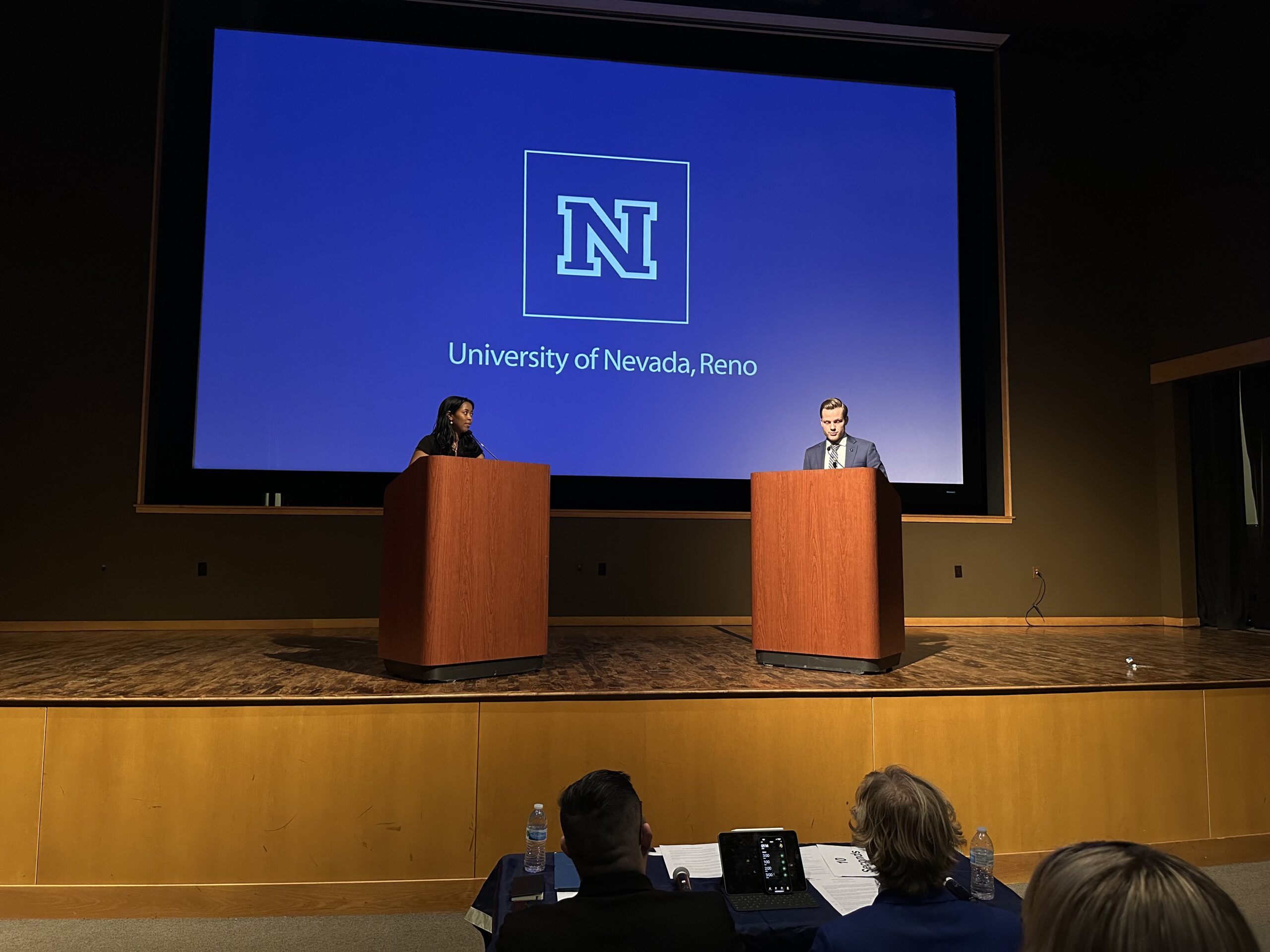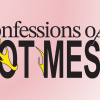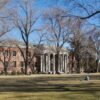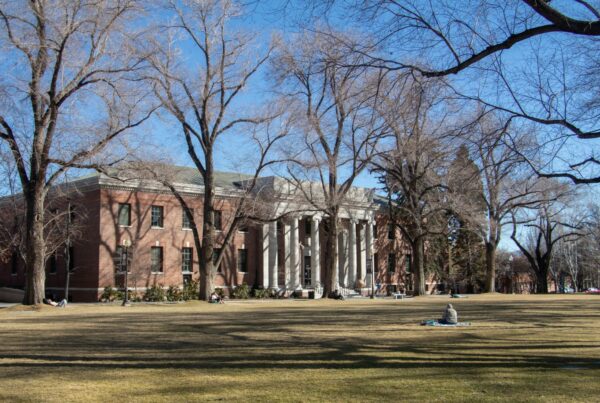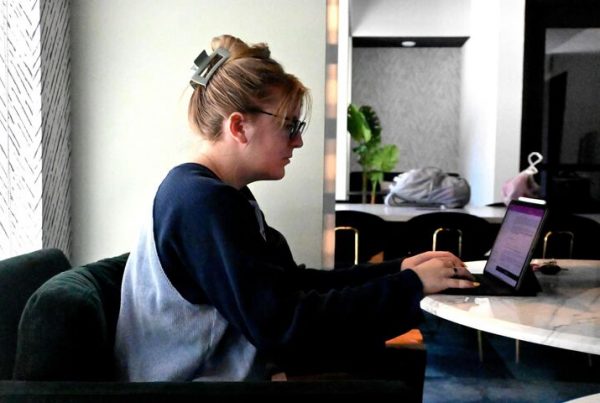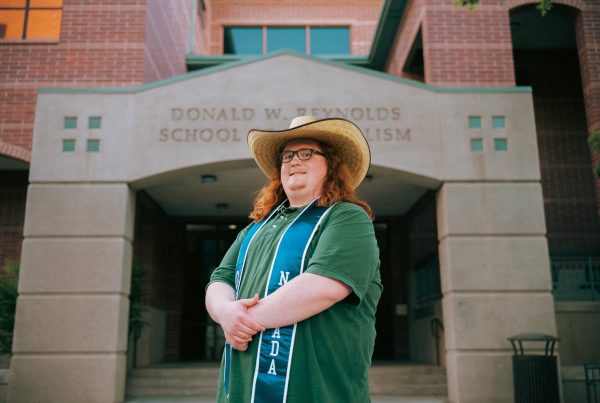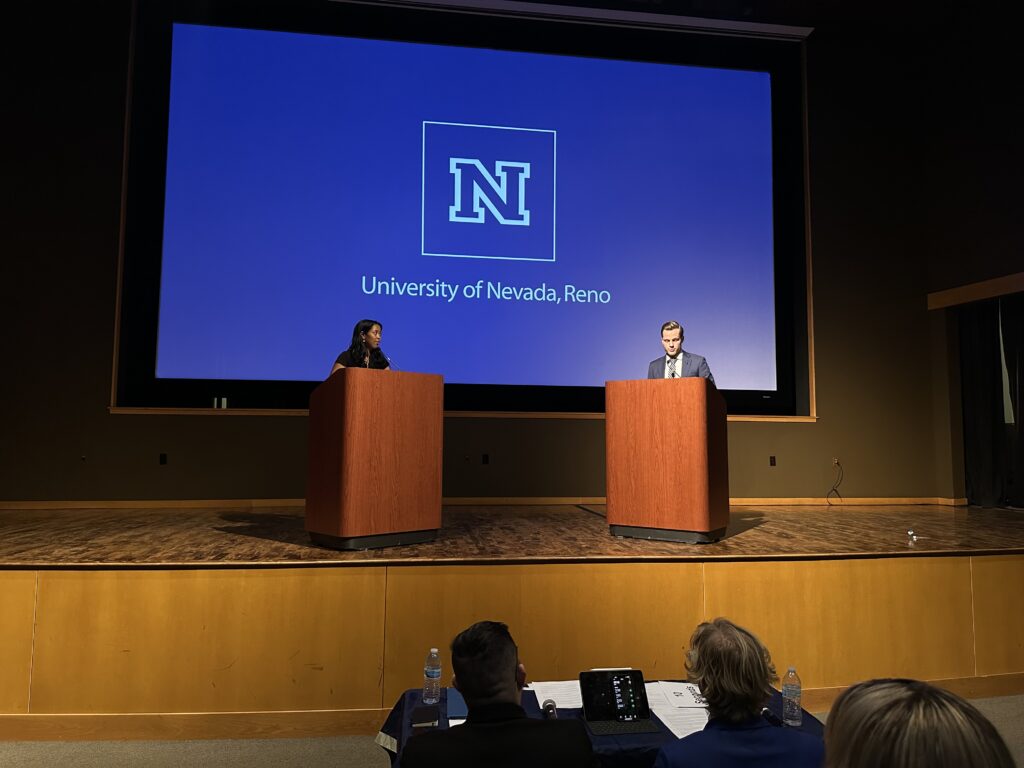
Presidential candidates Dawson Deal (right) and Fayza Salah (left) answer questions for the ASUN presidential debates on March 12.
The Associated Students of the University of Nevada, Reno has a rapidly approaching election underway with general voting beginning on March 13 and continuing through March 14.
Currently, the two campaigns competing include YOURNevada, with presidential candidate Fayza Salah and vice presidential candidate Isabella Valdivieso versus Impact Nevada, with presidential candidate Dawson Deal and vice presidential candidate Liesel Kemmelmeier.
The presidential debates between Salah and Deal occurred earlier this evening for an hour of time.
Opening statements
Salah won the coin toss and was granted the starting opening statement.
Salah says that the goals of her campaign are rooted in her own personal values, and that she wants to be ASUN president not for her own personal gain, but to be able to empower others.
“I’m also deeply committed to the principles of leadership and civic engagement,” Salah said. “My passion for student government and my inclination towards leadership positions have always stemmed from a genuine desire to give back to my community.”
Salah said their campaign YOURNevada seeks to enhance the University of Nevada experience.
Deal said the Impact Nevada campaign focuses on inclusivity, unity and impactful leadership.
“ASUN is often seen as a black box and often very exclusive from our student body. And that shouldn’t be the case,” Deal said. “We work for the students and not for ourselves, so we should be ensuring that those voices are brought to the table.”
Deal said their goals range but they want to make an impact on the university and make students proud of their college
Question 1: How do you plan to address the issues of diversity and inclusion on campus, ensuring that all students feel welcome and represented within the University of Nevada Reno community?
Deal said ASUN cannot represent every person on campus, so it’s important to bring new voices to the table and respect the fact that not everyone may want to get involved in ASUN. He added that their campaign is dedicated to increasing allocation of the budget to diversity, inclusion and extending that money to organizations working on initiatives.
“You don’t always have to start from scratch, right?” Dawson said. “If it’s not broken, don’t fix it. And I think somebody needs to start looking outwards when it comes to solving some of these problems on campus.”
Salah highlighted the need for inclusive policies that prioritize the safety and wellbeing of all students, including being more visible about the multicultural center and other diverse student organizations by being in more communication with them.
“I, just from personal experience, being a visible minority, recognize the importance of representation in leadership, and understand that students need leaders who understand and reflect their unique challenges,” Salah said.
She highlighted the multicultural center on the university campus and shouted out many ASUN officers that put on events like Black Fest and Lunar New Year. She said her and Valdivieso have been doing this with diverse groups already and plan to continue it in office.
Question 2: What specific measures do you propose to make higher education more affordable and accessible for all students at the University of Nevada, Reno?
Salah emphasized that there are huge financial barriers impacting students, and that she wants to be able to break those down. She highlighted food and housing insecurity, and application fees. She added that extending opportunities from the Passion Fund is also something she wants to work on to help this affordability and break down the barriers.
Deal says that affordability and accessibility is the number one goal for Impact Nevada. He explained that he wants to collect data from students to understand their main issues, and that creating an advisory board to have discussions about these issues would be beneficial.
Fayza asks a return question for Deal of how his suggested advisory board would help. Deal responded by saying that establishing a formal place to have those conversations would highlight its importance to the students.
Deal then asked for an extension for the discussion, and used that extension to remind people of the student government’s role.
“I think it’s really important that we recognize that the job of the student government is to not define their constituents’ experience, but to support their success, either academically or socially,” said Deal.
Question 3: Campus safety, especially now, is paramount. As student body president, how do you intend to foster a safer campus environment, particularly concerning issues such as sexual assault prevention, mental health support and campus security?
Deal explained that when addressing mental health on campus, there needs to be conversations about the logistics of providing that support. He says this is important in making sure that these resources have an impact on the students.
“We often say that we need more resources towards mental health,” Deal said. “But unless you specify what those resources are and where that money is going, we don’t know how much of an impact it’s going to have.”
Salah noted that campus safety is important to her. She explained how she wants to tie her ideas for campus safety back into one of her other goals which is to cultivate a community that embraces diversity and inclusivity.
“One of our pillars, specifically, is focused on campus safety,” Salah said. “So we’re really dedicated to prioritizing the safety and well-being of all students, especially those from diverse backgrounds, by implementing proactive measures and allocating resources to promote equity. and inclusion.”
Other goals of Salah’s include making it a requirement that incoming freshmen participate in an active shooter workshop training, and work on disseminating safety information effectively.
Question 4: How will you advocate for increased resources, and support for student research opportunities, academic enrichment programs and student support programs during your tenure as student body president?
Salah says that she supports increasing funding towards research experiences at UNR, explaining that the Pack Research Experience Program was a great experience for her, and that research is vital to the university.
Similarly, Deal mentioned that when collecting data from students to identify top issues, career readiness was one of the top issues, and so being able to further fund research is important to him.
Salah expressed her concern about students not taking advantage of resources for their academics, and that it’s important that students are aware of the tools around them.
“I was really shocked to learn that a lot of students don’t go to the tutoring center,” said Salah. “There are resources for you if you need it.”
Deal explained that it’s important for the university to provide opportunities for students that would help them succeed post-academically, like covering application fees for graduating undergraduates who may want to pursue professional school.
Question 5: Can you both explain an initiative that you’ve created and implemented in previous sessions that have aligned with your current campaign goals?
Deal highlighted Reno mayor Hillary Schieve’s visit to the UNR campus last fall, which was an event that he and Kemmelmeier moderated. He recalled a moment when he was able to get students to connect with Schieve and that made him feel proud of the progress ASUN has made.
“I think that should be the attitude of ASUN going forward,” said Deal. “I think our goal is to try to support a broad amount of students and try to address their every need, but sometimes I think it’s okay if we take a look back and look at the progress that we have made.”
Salah talked about how she sponsored a piece in the ASUN senate that would give a seat in the senate to a senator from the Honors College.
“It’s so great to see that come to fruition and have Honors College representation at Senate now,” said Salah.
She also highlighted her time as a College of Science senator, and her work in helping with the Pre-Health Conference on campus.
Audience Questions:
How will each of your platforms help support students here on campus with disabilities? What experience and initiatives in this sphere do you bring to the table?
Salah said it wasn’t something she thinks she put a lot of thought into, but she remembers a few years ago that the director of sustainability for ASUN mentioned the lack of access for students that are in wheelchairs. She added that the safety walks makes her recognize there are really big cracks around campus and she believes giving input and making sure changes are carried out should help.
Deal said this is something he has thought a lot about with tour guides who are well acquainted with the ADA route around campus. He said it has some flaws and agrees there’s a lot of room for improvement.
He added that their campaign is advocating for funding, which will include funding for accessibility. He said at the last legislative session Brian Sandoval, president of the university, asked for 10.4 million dollars for increased ADA access and Deal agrees it’s important to continue and possibly increase this fund. He added that the ramp in front of Lawlor Events Center was a specific line item and he wants to continue specific conversations for things like this, even with the budget difficulties for higher education.
Salah asked about what Deal meant by “advocating for funding.” She said that in specific services they go out and find grants, so Salah was asking Deal how he was going to do this for students.
Deal said engaging in conversations with elected representatives and continuing to give public comment can help. He said sharing student experiences, if they’re comfortable, will also help.
Salah said the business building takes a lot of the capital improvement fund, but she thinks moving forward this money could also go to the ADA fund.
Building your administration is very important. What will you consider when hiring your cabinet?
Deal emphasized that hiring a cabinet is very serious and that he received advice from the previous director of government affairs to not hire too quickly. He added that looking for people that are right for the expertise of the position is important. He said bringing diverse perspectives to the table, even if they were not previously in ASUN is important as well.
Salah agreed, saying prioritizing diversity and inclusion in her cabinet is so important, something she’ll continue to advocate for over and over again.
“By fostering a diverse team, we can benefit from a wide variety of insights and ideas,” Salah said. “My perspective can be different from somebody else’s perspective, that comes from a different background.”
She wants to find people that are dedicated to advocacy, but she said they are very focused on not promising positions to people. Salah said seeing candidates who have a track record of this work will be what she’s looking for, along with people who are interested in fostering a positive environment.
Deal added that finding people that are invested in helping ASUN and putting in the work is also essential.
You both hold important positions in ASUN currently. How have you brought student voices to the table thus far?
“As the speaker of the senate, I think that’s the easiest way to bring student voices to the table,” Salah said. “In my role, I try my best to have presenters come in whenever it’s pertaining to issues that students are concerned about.”
Salah listed the example of bringing Title IX when the Feifei Fan allegations were circulating. When the Google emails were announced to be removed, Salah said she brought in people from IT to talk about the Microsoft transition.
Deal mentioned examples of bringing Jeffrey Downs, the vice chair of the Board of Regents of NSHE to discuss the higher education budget, bringing the mayor of Reno to talk to students about the city and university collaboration and discussing the department’s recent event called “Pizza and Politics” inviting local city council and commissioners to discuss student voices.
“I think you can always have a great conversation over a slice of pizza,” Deal said.
Deal added that exposing the student population to the diverse national political arena with the visit from Marianne Williamson, a candidate who was running for president is also important.
Closing statements
Deal said ensuring student resources and meeting student needs is what it comes down to for their Impact Nevada campaign.
“I think all in all our campaign is focused on ensuring the success of our students,” Deal said. “I keep coming back to the fact that ASUN cannot solve every problem on campus, although I wish we could, I think we can do a really good job by investing our money in good and proper places to where they actually make an impact.”
He added that the goals they have in their campaign will be continuative initiatives and they won’t stop here. Deal said he and Kemmelmeier have an invested interest in what the university looks down the road.
He also said connecting with the needs of the students and hearing them is important, something that both their campaign and Salah-Valvidieso’s YOURNevada campaign have.
Salah agreed, saying she completely respected the Deal-Kemmelmeier campaign.
She then continued to say her own campaign seeks to enhance the university experiences by empowering all student voices and promoting unity. Salah added that true inclusivity means actively seeking out and amplifying voices.
“So when those who lead us reflect the diversity of our student body, it sends a powerful message,” Salah said. “That everyone belongs and has a stake in shaping the future of our institution.”
Voting for both the presidential and vice presidential elections will occur on March 13 and 14.
Jaedyn Young, Jessie Cabrera and Nick Stewart can be reached at jaedynyoung@sagebrush.unr.edu or ns@sagebrush.unr.edu or on Twitter @NevadaSagebrush.

